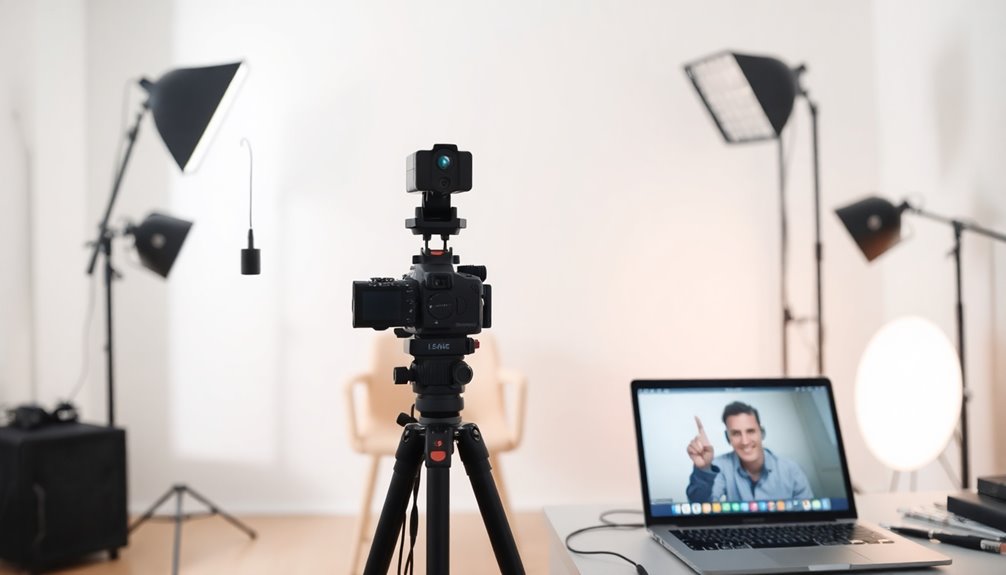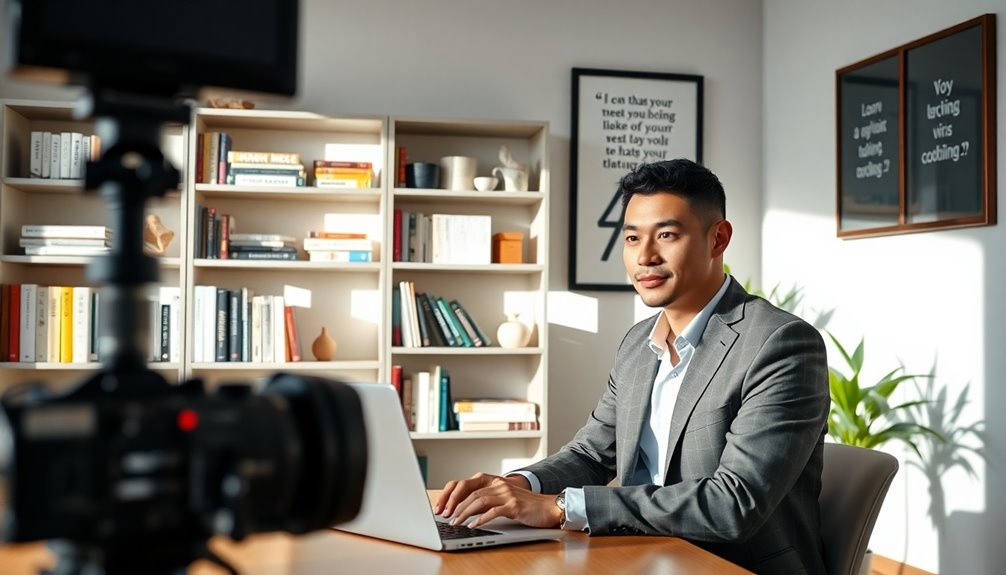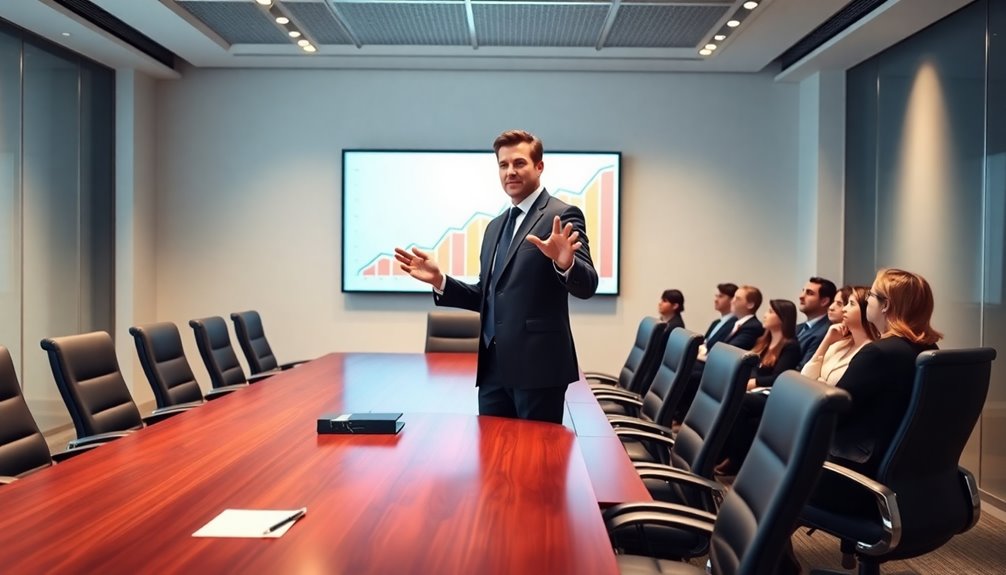Mastering video interviews is essential for standing out in today's job market. Start by selecting a quiet, well-lit space to minimize distractions and test your tech beforehand. Dress professionally, opting for softer colors like light blue or gray to create a polished appearance. Maintain eye contact with the webcam and use open body language to engage the interviewer. Familiarize yourself with both live and pre-recorded formats, as each requires different strategies. Remember to have your resume handy and stay calm if tech issues arise. Discover more practical tips to truly shine in your video interviews.
Key Takeaways
- Choose a quiet, well-lit space and test your technical setup to ensure a smooth interview experience.
- Dress professionally as you would for an in-person interview, opting for soft colors and minimal accessories.
- Maintain eye contact with the webcam and use open body language to convey engagement and confidence.
- Familiarize yourself with both live and pre-recorded interview formats to adapt your responses accordingly.
- Prepare notes and have your resume handy to reference key points and experiences during the interview.
Video Interview Preparation

When preparing for a video interview, it's crucial to create an ideal environment that minimizes distractions and maximizes your chances of success.
Choose a quiet, private space with good lighting, ensuring you won't be interrupted. Lock the door and clear your desk of clutter. Have your resume and relevant notes at hand, along with a glass of water for hydration.
Test your webcam and audio beforehand to confirm everything works smoothly. Practice video calls with friends to get comfortable with the setup.
Close unnecessary browser tabs and applications to improve performance.
This preparation not only boosts your confidence but also helps you present yourself professionally, making a strong impression on your interviewer.
Understanding Interview Formats

After you've set up your environment for a video interview, it's important to understand the different formats you might encounter.
You'll primarily face live and pre-recorded interviews. In a live interview, you'll interact in real-time with the interviewer, which requires quick thinking and adaptability. These typically take place on platforms like Zoom or Google Hangouts.
On the other hand, pre-recorded interviews involve answering questions that are recorded for later review, allowing you to prepare your responses more carefully.
Familiarize yourself with both formats to feel confident and ready. Each format has its nuances, so understanding how to approach them will enhance your performance and help you make a positive impression on potential employers.
Professional Appearance Guidelines

A professional appearance is essential for making a strong impression during video interviews. Dress as you would for an in-person interview, opting for softer colors and avoiding bright patterns. Remember, looking polished goes beyond what's visible on camera; guarantee you're professional below the waist too. Here's a quick reference guide to help you choose your outfit:
| Attire Type | Recommended Colors | Avoid Colors |
|---|---|---|
| Shirt/Blouse | Light Blue, Gray | Bright Red, Neon |
| Tie (if applicable) | Solid Colors | Loud Patterns |
| Pants/Skirt | Dark Colors | Distressed Denim |
| Accessories | Minimalist | Overly Flashy |
Effective Body Language Tips

Effective body language plays an essential role in video interviews, as it can convey confidence and engagement even from a distance.
When you're on camera, your non-verbal cues can make a lasting impression. Here are some effective body language tips to keep in mind:
- Maintain Eye Contact: Look at the webcam to create a connection, rather than staring at the screen.
- Use Open Posture: Sit up straight and avoid crossing your arms, which can signal defensiveness.
- Nod and Smile: Show you're actively listening and engaged; it encourages a positive interaction.
Technical Setup Essentials

Ensuring your technical setup is in top shape is just as important as mastering your body language during a video interview. Start by testing your internet connection, audio, and webcam well in advance.
Choose a quiet, well-lit location, and eliminate distractions by closing unnecessary tabs and apps. Conduct practice sessions with friends or family to build confidence and address any technical hiccups.
It's also smart to have a backup plan; get a contact number from your interviewer in case of technical difficulties. If issues arise during the interview, stay calm—mute your mic if there's background noise and pause until everything stabilizes.
Common Interview Questions

What common interview questions should you prepare for to make a strong impression? Anticipating these questions can greatly boost your confidence and help you articulate your thoughts clearly.
Here are a few key ones to focus on:
- Tell me about yourself.
- What are your greatest strengths and weaknesses?
- Why do you want to work here?
Resources for Improvement

After preparing for common interview questions, it's time to enhance your skills further by exploring additional resources.
Start by reviewing sample interview questions and answers specific to your field. Websites like Glassdoor and LinkedIn often provide insights into what employers are looking for.
Consider watching video tutorials on platforms like YouTube that cover video interview techniques, including body language and camera positioning.
Join online forums or groups where you can share experiences and gain advice from others.
Don't forget to read articles on industry trends to stay updated.
Finally, practice with friends or mentors for constructive feedback.
Continuous improvement is key, so keep learning and adapting to refine your video interview skills. Additionally, seeking out high-quality content can significantly enhance your understanding of effective interview strategies.
Frequently Asked Questions
What Should I Do if I Can't Connect to the Interview Platform?
If you can't connect to the interview platform, first check your internet connection and restart your device if necessary.
Try accessing the platform through a different browser or app.
If issues persist, reach out to the interviewer using their contact number to inform them.
You might need to switch to a phone call or reschedule.
Always stay calm and professional, as technical difficulties can happen to anyone.
Can I Eat or Drink During the Video Interview?
You shouldn't eat during a video interview, as it can be distracting and unprofessional.
If you're feeling thirsty, it's okay to sip water, but do so discreetly and only if necessary.
Make sure you're well-hydrated beforehand to avoid interruptions.
Focus on making a strong impression with your answers and body language instead.
Keeping your attention on the interview shows respect for the opportunity and the interviewer's time.
How Do I Handle a Difficult Question During the Interview?
Facing a difficult question during an interview can feel like climbing Mount Everest without gear!
Don't panic. Take a deep breath, pause for a moment to gather your thoughts, and then respond. If you need clarification, don't hesitate to ask the interviewer to elaborate.
Structure your answer by addressing the question directly, sharing a relevant example, and highlighting what you've learned.
Should I Use a Virtual Background for My Video Interview?
Using a virtual background can be a double-edged sword in video interviews. If you choose one, make certain it's professional and doesn't distract from you.
However, natural backgrounds often convey authenticity. If your environment is cluttered or noisy, a virtual background might be a good option.
Just guarantee your tech can handle it without lag. Ultimately, it's about presenting yourself clearly and confidently, so go with what feels right for you.
What Follow-Up Actions Should I Take After the Interview?
After your interview, it's important to follow up promptly.
Send a thank-you email within 24 hours, expressing gratitude for the opportunity and highlighting key points from your conversation. This shows your enthusiasm and reinforces your interest in the position.
If you haven't heard back within a week or two, consider reaching out to inquire about the status of your application. Staying proactive can keep you top-of-mind with the hiring team.
Conclusion
In today's fast-paced job market, mastering video interviews is your secret weapon. By following these essential tips, you'll not only navigate the digital landscape with ease but also leave a lasting impression on potential employers. Remember, it's not just about what you say but how you present yourself—like delivering a blockbuster performance on screen. So gear up, stay confident, and let your unique personality shine through. You've got this—now go ace that interview!









